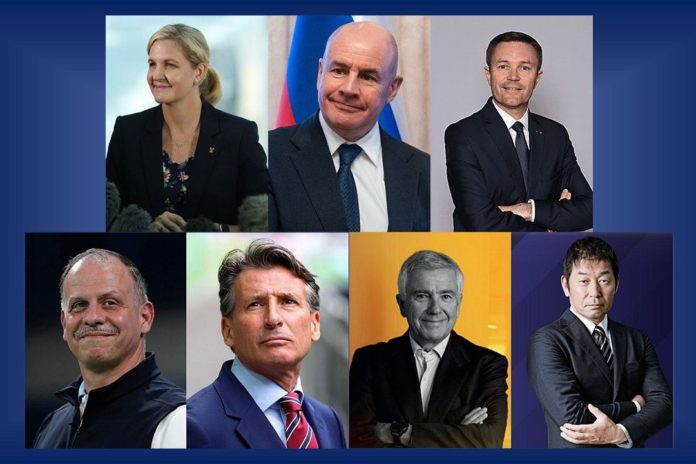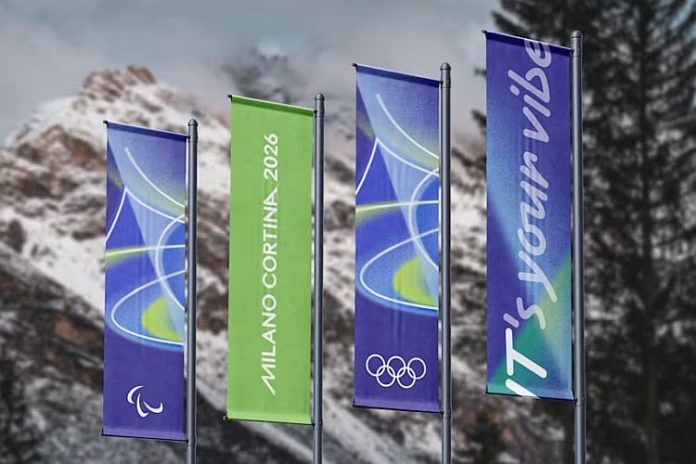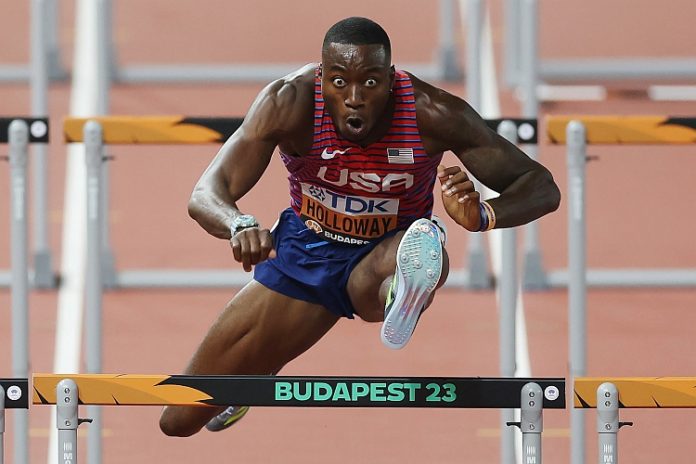★ The Sports Examiner: Chronicling the key competitive, economic and political forces shaping elite sport and the Olympic Movement.★
★ To get the daily Sports Examiner Recap by e-mail: sign up here! ★
≡ IOC PRESIDENTIAL ELECTION ≡
/Updated/In a month – 20th of March – the International Olympic Committee will elect its 10th President, at the 144th IOC Session in Costa Navarino, Greece. It’s the most important meeting of IOC members since Thomas Bach was elected in 2013, and completely changed the trajectory of the Olympic Movement.
The highly-successful London 2012 Olympic Games was then a memory, and there were already reports of the tens of billions being spent to upgrade the Russian resort city of Sochi for the Olympic Winter Games of 2014. Four potential European hosts for the 2022 Winter Games were pulling out over the costs of staging the Games, eventually leaving a choice between 2008 summer host Beijing and Almaty in Kazakhstan.
Bach transformed the IOC and the way Olympic Games are bid for and staged, eliminating the “winner takes all” bid format that produced devastated losing cities and countries, and insisting that no new venues be built for future Games, unless to meet a local, long-term need not associated with the Games.
But that approach also removed from the membership the too-often-abused perk of selecting Olympic host cities. Bach instituted a wide-ranging social-action program at the IOC, teaming with the United Nations and others to create programs which sometimes had nothing to do with sport. Under his leadership, the IOC spoke with one voice – his – and business was conducted almost solely by the IOC Executive Board.
Many members had little to do, and didn’t like it.
Now, all of this is on the table in a month, with seven candidates from six countries:
● Prince Feisal Al Hussein (JOR)
● Sebastian Coe (GBR)
● Kirsty Coventry (ZIM)
● Johan Eliasch (GBR)
● David Lappartient (FRA)
● Juan Antonio Samaranch (ESP)
● Morinari Watanabe (JPN)
There is plenty of intrigue, opinions and posturing, and there is no obvious favorite, even with a month to go.
The voting procedure is convoluted as well, with the IOC members from any country which has a candidate in the running not allowed to vote. And the candidates cannot vote as long as they are still running. The elimination protocol:
“If no candidate obtains the absolute majority of votes in a round of voting, there will be other rounds of voting until a candidate obtains the absolute majority of the votes. The candidate obtaining the fewest votes in each of the rounds of voting will be eliminated and will not participate in the following round of voting.”
IOC President Bach, under the regulations, will not vote in any round except if there is a second tie between two final candidates, then he can vote “after consultation with the IOC Executive Board.”
So, if all 109 IOC members show up – and some will not, for health reasons if nothing else – the first round of voting will include a maximum of 92, removing the candidates (7), Bach (1) and other members from France (3), Great Britain (2), Japan (2) and Spain (2).
That means a maximum of 47 votes will be needed to win on the first round, but with more and more in succeeding rounds as candidates are eliminated (and their countrymen/countrywomen are added back).
Why is this important?
Because in the recent decades of voting by IOC members, a promise by a member to vote for someone is often for the first round only. After that, they are usually on their own.
In conversations with IOC members, close associates and long-time observers, there are some themes which have emerged:
● Watanabe’s radical idea of a five-continent Olympic Games, with events going on 24 hours a day at five different locations, each hosting 10 sports is too crazy. His English skills are modest – important in today’s world – and his International Gymnastics Federation (FIG) was embarrassed by the women’s Floor Exercise bronze-medal judging quagmire between Romanian and U.S. athletes.
If there is no first-round winner, he is widely expected to be the first eliminated.
● There is no doubt whatsoever that Bach favors Zimbabwe’s two-time Olympic swimming champion Coventry, who since 2018 has been the national Minister of Youth, Sport, Arts and Recreation. Coventry would be the first woman IOC President and the first from Africa, in line with Bach’s drive for gender and continental equity.
At 41, she is the youngest of the candidates by far, and has been a high-profile member and has been praised for outstanding work as the head of the IOC Athletes’ Commission from 2018-21.
Some 76 of the current 109 IOC members have been elected during Bach’s presidency, but he hardly has control of them all, especially those who have chafed under his firm control of the organization. But he has been helping Coventry, and is for her.
Her best chance to win is on the first ballot, and could see her support drop in successive rounds. But she is a real contender.
● By resume, Coe is the most qualified. Not only a two-time Olympic champion in the men’s 1,500 m, he has been a member of the British Parliament and in the leadership of the opposition, head of the British Olympic Association, founder and head of a sports marketing agency, chair of the London 2012 Olympic organizing committee, and now in his third and final term as the President of World Athletics. He really has done it all.
He earned the enmity of some members – especially other International Federation officers – for World Athletics’ unprecedented introduction of prize money for the Paris 2024 Olympic Games, paying $50,000 to each winner (individual or relay), without prior consultation. He has apologized for the lack of prior notice or discussion, but remains forthright that athlete financial welfare is important.
Some see Coe as the favorite, given his extraordinary expertise in decades of service to the Olympic Movement. Moreover, he made a remarkable offer in his manifesto that he will stand for re-election after four years, not after the full term of eight. At 68, Coe is age-limited under the Olympic Charter (five of the seven are), but an election after four years, with the attending age-limit changes, would solve that.
If Coventry does not win on the first ballot, Coe could very well be the second-ballot choice.
● Samaranch, 65, is the long-serving IOC member among the candidates, having been elected in 2001. Son of the transformational IOC President Juan Antonio Samaranch (ESP), who served from 1980-2001, he has been deeply involved in the IOC, serving on the Executive Board and as a Vice President for almost a decade and on Coordination Commissions for Turin (ITA: 2006), Sochi in 2014 and the Beijing Winter Games in 2022.
He is completely at home in the U.S., having earned his Masters in Business Administration from New York University, and from his financial management business, which has brought him to the U.S. many, many times.
Reports from the Candidate Presentations on 30 January praised Samaranch’s talk as warm and engaging and he is seen as capable, a good listener and someone who can appreciate all sides of an issue. If Coventry and Coe cannot win, the door is open for Samaranch as someone that all of the members can get along with. And he has made the most concrete promises to provide member support all year round.
● What about Al Hussein, Lappartient and Eliasch? All have good reasons to be considered, but also reasons not to be.
Eliasch, 63, who became a billionaire as the chief executive of the apparel and sporting goods giant Head, joined the IOC only last year and has said that competence is more important than any other attribute for the next IOC President. Perhaps true, but how many know him enough to trust him? That’s a hard one to overcome.
Al Hussein, 61, has been an IOC member since 2010 and is the younger brother of Jordan’s King Abdullah. He has worked tirelessly to use sport for peace in his region, especially with children. He attended Brown University in the U.S. and has been an IOC Executive Board member and on the Coordination Commission for the Tokyo 2020 Games. He is widely respected within the IOC, but his position within Jordan requires him to sometimes assist his brother in national affairs and those responsibilities – in a continuously troubled part of the world – could conflict with an IOC Presidency. Not fair, but reality.
Lappartient, 51, is a man of enormous energy, but stretched thin. He is the President of the important Union Cycliste Internationale, also head of the French National Olympic Committee, and – if that weren’t enough – the former Mayor of Sarzeau (2008-2021) and now the President of the Counsel for the Department of Morbihan, in the Brittany region, since 2021. Wow.
At the Candidate Presentations in January, he was the only one not to have accompanying slides, an invitation to listen more closely, but that could also be taken as being too pressed for time already.
¶
How is this going to work out? Coventry and Coe are widely seen as favorites and the election of either would be no surprise.
In my discussions about this decision, it was repeatedly emphasized to me that this is not a clash of ideas or manifestos, but about people. In a world in which outsized personalities like Trump, Putin and Xi are prime movers, who can deal best with them?
Who has the smarts to deal with the fracturing media landscape, maintain existing broadcast and media revenue streams and create new ones?
Who can forge consensus within the Olympic Movement, but give members more opportunity to contribute in a meaningful way?
It comes down to trust, and to individual feelings about the candidates. In this area, Samaranch’s 24 years on the IOC, in positions of responsibility and a deep understanding of how all the pieces fit together, may be key.
There’s no way to know now, not yet. But we will know in a month, in a decision that will reverberate for years.
Rich Perelman
Editor
(Update: An earlier version incorrectly showed U.S. members as unable to vote due to having a candidate; there is no American candidate, so all four U.S. members can vote.)
★ Receive our exclusive, weekday TSX Recap by e-mail by clicking here.
★ Sign up a friend to receive the TSX Recap by clicking here.
★ Please consider a donation here to keep this site going.
For our updated, 895-event International Sports Calendar for 2025 and beyond, by date and by sport, click here!





















